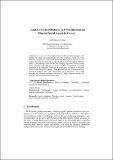Semi-automated dialogue act classification for situated social agents in games
Author(s)
Orkin, Jeffrey David; Roy, Deb K.
DownloadRoy_Semi-Automated.pdf (241.3Kb)
OPEN_ACCESS_POLICY
Open Access Policy
Creative Commons Attribution-Noncommercial-Share Alike
Terms of use
Metadata
Show full item recordAbstract
As a step toward simulating dynamic dialogue between agents and humans in virtual environments, we describe learning a model of social behavior composed of interleaved utterances and physical actions. In our model, utterances are abstracted as {speech act, propositional content, referent} triples. After training a classifier on 100 gameplay logs from The Restaurant Game annotated with dialogue act triples, we have automatically classified utterances in an additional 5,000 logs. A quantitative evaluation of statistical models learned from the gameplay logs demonstrates that semi-automatically classified dialogue acts yield significantly more predictive power than automatically clustered utterances, and serve as a better common currency for modeling interleaved actions and utterances.
Date issued
2011-01Department
Massachusetts Institute of Technology. Media LaboratoryJournal
Agents for Games and Simulations II: Trends in Techniques, Concepts and Design
Publisher
Springer Berlin / Heidelberg
Citation
Orkin, Jeff, and Deb Roy. “Semi-Automated Dialogue Act Classification for Situated Social Agents in Games.” Agents for Games and Simulations II. Ed. Frank Dignum. Berlin, Heidelberg: Springer Berlin Heidelberg, 2011. 148-162.
Version: Author's final manuscript
ISBN
978-3-642-18180-1